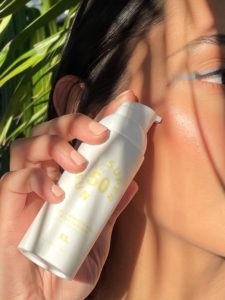Practicing sun safety is essential as temperatures rise and we spend more time out under the sun’s rays, soaking up their nourishing warmth but also large amounts of UV and infrared light, both of which can damage skin.
Vitamin C is a powerhouse antioxidant – protecting against cellular damage and helping the body deal with the many modern toxins it’s exposed to on a daily basis. But did you know that it can also benefit the skin,  especially during summer months? Here we take a look at how vitamin C helps to reduce the impact of sun damage, and why it deserves a place in your summer skin regime.
especially during summer months? Here we take a look at how vitamin C helps to reduce the impact of sun damage, and why it deserves a place in your summer skin regime.
How does vitamin C protect skin against the sun?
To understand how vitamin C protects the skin against sun damage, first it’s important to cover its many benefits for the skin even without the heat of the sun’s rays as a factor.
Vitamin C (or l-ascorbic acid) is a potent and powerful antioxidant. It plays a key role in neurotransmitter production, heart disease prevention and immune function. This is partly why people recommend vitamin C to ward off colds and flu – as it enhances immune system function, supporting the body’s natural protective processes.
So when it comes to your skin, vitamin C works in a very similar way, forming a protective barrier which supports the skin when in the sun. Fine lines and wrinkles can form as a result of oxidative stress on the skin, caused by environmental aggressors (including sun exposure) and pollutants. Vitamin c mitigates this effect for smoother, more youthful and glowing skin.
 Topical vitamin C vs dietary vitamin C
Topical vitamin C vs dietary vitamin C
One thing many people become confused with is the benefits of ingesting vitamin C vs using it topically on the skin. Which is best? The answer is both!
Consuming vitamin C offers a number of benefits specifically for the skin, including enhanced collagen synthesis and cell repair. There are vitamin c supplements available but generally, you should be able to get enough from your diet. Include fruits and vegetables rich in vitamin c, such as berries, sweet peppers, kale and kiwi.
Meanwhile applying vitamin C directly to the skin in cream or serum format allows active ingredients to enter the upper layers of the skin where they can work on-site to support skin health. Topical Vitamin C also has a brightening effect, cementing that enviable ‘summer glow’.
How to use vitamin C to boost skin health
Vitamin C can be used in a number of ways throughout summer (and beyond) to protect skin and slow down the emergence of signs of ageing.
*Vit C + sunscreen: Studies have shown that vitamin C combined with sunscreen offers much higher protection against sun damage and signs of ageing than using spf alone. Vitamin C serums can be used before applying sunscreen for full effect – although some sun protection products now build vitamin C into their formulas.
*Eat your vitamins! As detailed above, vitamin C can be found in many different foods, so it’s easy to stock up. Up your intake of leafy greens, broccoli, sweet potato, peppers and citrus fruits during summer months.
*Give yourself a boost: If you need to, you can also add vitamin C to your daily supplement roster. Leaky gut and other digestive conditions can affect the absorption of vitamins and nutrients from food – so if that’s the case, supplementation may be a better option alongside a healthy, balanced diet.
Learn more holistic summer skin tips here.






